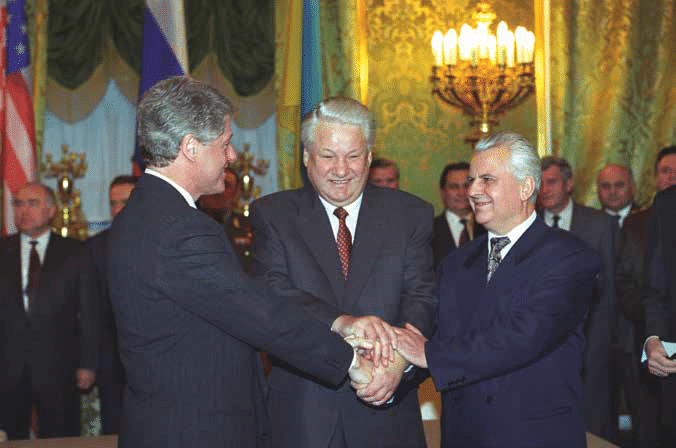Why the Ukraine war does not mean more countries should seek nuclear weapons
By Jeffrey W. Knopf | April 12, 2022
 US President Bill Clinton, Russian President Boris Yeltsin, and Ukrainian President Leonid Kravchuk sign the Trilateral Agreement on transferring nuclear weapons from Ukraine to Russia and associated matters in Moscow, January 1994. Photo credit: Joseph P. Harahan, historian of the Defense Threat Reduction Agency, and the Clinton Presidential Library.
US President Bill Clinton, Russian President Boris Yeltsin, and Ukrainian President Leonid Kravchuk sign the Trilateral Agreement on transferring nuclear weapons from Ukraine to Russia and associated matters in Moscow, January 1994. Photo credit: Joseph P. Harahan, historian of the Defense Threat Reduction Agency, and the Clinton Presidential Library.
Following the Russian invasion of Ukraine, many observers have concluded that the war offers a clear demonstration of the benefits of possessing a nuclear arsenal. An article in Foreign Policy described the war’s number one lesson as being “it is good to have nuclear weapons.” Two senior scholars at the Brookings Institution labeled the Russia-Ukraine war “bad news for nuclear nonproliferation,” while the authors of the piece in Foreign Policy went even further, declaring the war a “death blow to nuclear nonproliferation.” We should not be so quick to embrace this lesson. The war in Ukraine does not make as persuasive a case for nuclear proliferation as many suggest.
The Russian invasion does point to certain advantages of being a nuclear-armed state. But it is important to consider the full balance sheet of nuclear weapons pros and cons. In the Ukraine case, the benefits of nuclear status are not as great as some have claimed, while the potential costs and risks of nuclear weapon programs have received little to no attention. Also, the war in Ukraine is not the only case in which a nuclear-armed state has been involved in conflict with either a non-nuclear or another nuclear-armed country. A review of other historical cases shows the limitations of what states buy themselves when they acquire nuclear arms.
Two distinct lessons about the advantages of nuclear possession have been drawn from the war in Ukraine. The first concerns Ukraine itself. When the Soviet Union dissolved, part of the former Soviet nuclear arsenal was stationed on the territory of newly independent Ukraine. In the years after independence, Ukraine agreed to have these weapons removed from its territory and to join the nuclear Non-Proliferation Treaty (NPT) a non-nuclear weapon state. A growing chorus now regards this as a mistake. They argue that Russia would never have dared to invade if Ukraine had been nuclear-armed.
A second lesson focuses on Russia. Despite vigorously condemning the Russian attack, the United States and its NATO allies have refrained from intervening militarily themselves. The US government has steadfastly resisted Ukrainian pleas for a no-fly zone. As President Biden himself acknowledged, he does not want to take any step that could lead to direct confrontation between US and Russian troops because of the risk of escalation that leads to a nuclear World War III. This shows the powerful deterrent effects of Russia’s nuclear forces. And lest NATO governments be in any doubt, President Putin has reinforced the deterrent message with an ostentatious warning that any outside intervention against Russian military operations would be met with “consequences you have never seen in history.” To some observers, this suggests that nuclear weapon states can engage in aggression with impunity.
Taken together, the two lessons seem to make a powerful case for why more countries should seek nuclear weapons. Those without the bomb are at risk of being invaded. And those with a nuclear deterrent are not only safe from attack but also able to intervene militarily in other countries without having to fear a military response from other major powers. Both arguments contain an important kernel of truth, and it is not my intent to refute them in their entirety. But they do not constitute a full cost-benefit analysis. Not only do these lessons ignore the costs and risks associated with the pursuit and possession of nuclear weapons, they also overstate the benefits. A closer examination of the Ukraine conflict and other cases leads to a much more qualified assessment. The many compelling arguments that led most of the world to oppose nuclear proliferation still have merit.
First, it is important to address the expressions of regret that Ukraine “gave up” a nuclear arsenal. There is a substantial element of mythmaking in this claim. Ukraine never had operational control of the former Soviet weapons. Instead, the ability to launch them remained in Russian hands. In addition, if Ukraine had somehow managed to wrest command and control of the nuclear weapons from Russia, it would have been hard pressed to maintain them. Ukraine had no defense infrastructure for manufacturing nuclear weapons, including no ability to produce tritium, which must periodically be replaced in order to keep nuclear fusion warheads functional. The claims that Ukraine could have prevented Russia’s aggression ignore the fact that Ukraine never actually had a usable nuclear deterrent.
Moreover, if Ukraine had attempted to seize control of the weapons, this would have changed Ukraine’s future for the worse. Russia would have regarded this as a serious threat to Russian security, and armed conflict with Russia might have come about much sooner, with Ukraine even less prepared to resist. A Ukrainian attempt to become a nuclear weapon state would also have alienated the West. Ukraine would not have been welcomed as a potential member of the community of democratic nations and would instead have been treated as a pariah state like Iran. In addition, had Ukraine not signed the NPT, it would have lost access to nuclear fuel and technical assistance needed for its civilian nuclear power plants, which provide much of the country’s electricity. In short, an attempt to obtain a nuclear deterrent might not have succeeded and would have left Ukraine isolated and exposed.
Other historical examples also make it clear that possessing a nuclear arsenal is no guarantee against being attacked. In October 1973, Egypt and Syria launched a surprise attack on Israel despite being well aware that Israel had by that time obtained a nuclear capability. The two aggressors were motivated by desire to regain territories they had lost in the Six Day War in 1967—the Sinai Peninsula in Egypt’s case and the Golan Heights for Syria—and their military assault did not threaten Israel’s existence, but even so Israeli Defense Minister Moshe Dayan broached the possibility in government deliberations that Israel might need to use its weapons of “last resort.” In 1982, Argentina launched a military assault to try to seize the Falklands Islands (which it called the Malvinas). Although located off the coast of Argentina, the islands were British possessions populated by English citizens. The war did not threaten the British Isles, but the fact the United Kingdom had nuclear weapons and Argentina did not clearly produced no hesitation in Argentina’s willingness to attack a British possession.
There are even cases in which two nuclear-armed states have engaged in direct combat. In 1969, China and the Soviet Union clashed on multiple occasions along the Ussuri River, where there was disagreement about the location of the border between the two communist countries. Thirty years later, just one year after both sides conducted nuclear tests, Pakistan attempted to infiltrate troops disguised as local insurgents into the Kargil region of Indian-controlled Kashmir. India discovered the ruse, and fighting between the two sides lasted for more than two months, resulting in more than 1,000 battle deaths.
These multiple historical examples show that nuclear weapons do not deter all forms of aggression. So far, they do seem to have prevented truly existential threats from being carried out. But they do not necessarily prevent lower levels of conflict, especially over disputed territory. This suggests that a nuclear-armed Ukraine would probably never have experienced a Russian assault on the scale of the initial Russian invasion, where troops entered from three directions with the intent of taking the capital city of Kyiv. But in areas where Russia has contested Ukrainian possession, such as the Crimea and the Donbass, Russia’s actions might well have been the same even had Ukraine somehow equipped itself with nuclear arms. The use of “little green men” in Crimea or the arming of separatists in the Donbass are, after all, not very different from what Pakistan attempted in Kargil.
Just as Ukraine would not have benefited as much from attempting to become a nuclear weapon state as the current discourse assumes, it is also the case that Russia has not gotten as much benefit from having a nuclear arsenal as many people seem to think. Most important, Russia’s nuclear assets have done nothing to persuade the Ukrainians to surrender. Russia’s threats and conventional military attacks against Ukraine are a form of compellence, or an attempt to get an actor to change its policy or behavior, rather than deterrence, which seeks to prevent an action not yet taken. Scholars have long recognized that it is harder to compel than to deter, and research by Matthew Fuhrmann and Todd Sechser found that efforts to use nuclear threats for compellence are particularly unlikely to succeed. Nuclear weapons are completely unsuited to taking or holding territory. As long as Ukrainians are willing to resist Russian occupation, they will continue to do so, and Russia’s nuclear status offers no help in changing the resistance to Russian military advances on the ground.
Clear limits can also be seen in regard to the reach of Russian nuclear deterrence. Russia’s nuclear saber-rattling has done nothing to prevent the international community from imposing and maintaining crippling economic sanctions. Neither has it dissuaded outside parties from providing military assistance—including highly effective anti-tank weapons—to Ukraine. The nuclear threat has created an upper limit on how far the United States and its NATO allies are willing to go; it was likely a factor in US unwillingness to transfer Polish MiG fighters to Ukraine. But nuclear deterrence appears to be effective only above a certain, high-level threshold. Below that, nuclear threats lack credibility, and the opponents of Russia’s invasion show no hesitation in continuing to channel arms and equipment to Ukraine.
Nuclear deterrence also cuts both ways, and it constrains both Russia and NATO. Even with an extensive portfolio of nuclear capabilities, Russia has had to limit its actions or risk nuclear escalation. There are obvious military incentives for Russia to consider hitting NATO supply routes through Poland or Romania. Yet, despite evident frustration at NATO military assistance to Ukraine, Russia has so far carefully kept all its military operations confined to the Ukrainian theater. Just as NATO countries have been wary of directly engaging Russian forces, so has Russia refrained from attacking NATO troops or the territory of any NATO member. This could change as Putin’s frustrations mount, but the initial weeks of the war show that just as fear of nuclear escalation induces caution on how far the United States and NATO are willing to press, it creates just as much hesitation on Moscow’s part. Ukraine is suffering a tremendous pounding as a result of the tacit red lines being observed, but these same red lines also limit Russia’s ability to expand its military campaign in a way that would help it achieve victory.
Finally, it is worth remembering what happens to countries that seek or obtain nuclear weapons. Since the NPT entered into force, any country that pursues nuclear weapons ends up being hit with economic sanctions and diplomatic isolation. In some cases, such as Iraq and Syria, countries have also been struck by military attacks aimed to prevent them from completing construction of the facilities needed to build the bomb. And once countries achieve an operational nuclear capability, they get added to the list of nuclear targets by existing nuclear weapon states that regard them as a potential threat. Nuclear-armed countries find themselves constrained to behave cautiously lest they risk escalation that could result in their annihilation. For these reasons, the pursuit and acquisition of nuclear weapons is not necessarily a net benefit.
Nuclear weapons are a powerful deterrent against existential threats that could put a country’s survival at risk. Most analysts believed this to be true before Russia’s attack on Ukraine, and the war in Ukraine offers no reason to change that view. But there are limits to the reach of nuclear deterrence. It does not prevent the possibility of a country being attacked for less than existential aims. It does not prevent people attacked by a nuclear-armed power from resisting, nor does it prevent the international community from imposing sanctions or providing assistance to the party under attack. It certainly does not provide a nuclear-armed state with the ability to impose its will or succeed in getting its way or win a military victory at the conventional level. The pursuit of the bomb makes it likely a country will be diplomatically isolated and suffer economic sanctions. And success in getting a nuclear arsenal means other nuclear weapon states will target their arms on that country, and any future military conflict will create a risk of escalation that could end in the country’s destruction. The vast majority of the world’s nations have rejected nuclear weapons and embraced the goal of nonproliferation for good reasons.
These reasons remain compelling despite the putative lessons of the war in Ukraine. The war does not by itself make the case for more countries to seek or in some cases hold onto nuclear weapons. Each state will have to do its own weighing of the benefits against the costs and risks. And the benefits remain less than advertised, while the costs and risks can be considerable. An analysis that takes into account the full balance sheet of pros and cons from both Ukraine and earlier cases does not lead to a persuasive argument for nuclear proliferation. Commentators who trumpet the Ukraine war as an example of the value of nuclear weapons offer misleading advice that could end up weakening nonproliferation norms that have greatly benefited humanity.
Together, we make the world safer.
The Bulletin elevates expert voices above the noise. But as an independent nonprofit organization, our operations depend on the support of readers like you. Help us continue to deliver quality journalism that holds leaders accountable. Your support of our work at any level is important. In return, we promise our coverage will be understandable, influential, vigilant, solution-oriented, and fair-minded. Together we can make a difference.
Keywords: Russia, Russia-Ukraine, Ukraine, Ukraine war, compellence, nuclear costs and benefits, nuclear proliferation
Topics: Nuclear Weapons















For hypothetical consideration, would Sweden and NATO be better off if Sweden joined NATO, or if Sweden (re-)econstituted its latent nuclear weapons capability/capacity that it voluntarily gave up in the 1970s?
All those words to say: Ukraine should have gotten nuclear weapons.
The article admits nuclear weapons deter other countries from trying to wipe the armed country out of existence. It then rattles of a multitude of reasons why nuclear weapons as a deterrent are of limited effectiveness in a less than existential threat. But Ukraine is facing an existential threat.